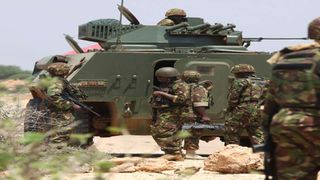
Kenya Defence Forces soldiers under Africa Union Mission in Somalia (Amisom) patrol Kismayo town in this picture taken on November 22, 2015.
| File | Nation Media GroupNews
Premium
ICJ thunderbolt: Uhuru’s tough choices on KDF troops in Somalia
The International Court of Justice’s (ICJ) unfavourable judgment on the maritime dispute with Somalia has left the Kenya Defence Forces (KDF) in a Catch-22 situation.
President Uhuru Kenyatta and his generals have to make a decision on the troops’ continued operations in the war-torn nation under the African Union Mission for Somalia (Amisom).
Mogadishu has in recent years not shied away from its displeasure about the presence of Kenyan soldiers in the country, and calls for their withdrawal are likely to increase in the coming days.
President Kenyatta will have to decide whether his troops will continue to assist in securing ‘an enemy state’, while at the same time defending Kenya’s territory from the same nation.
KDF has been part of a 12,000-strong Amisom force that has been helping the Somali National Security Forces to fight the Al-Shabaab militants. After yesterday’s ruling, however, the troops will also be expected to secure 160,000-square kilometres of territory in the Indian Ocean believed to contain vast oil and gas deposits.
Nairobi indicated it won’t cede an inch of territory to another country and vowed to deploy the military to fight off any form of aggression.
Economic ramifications
“Kenya recognises and has consistently indicated as much, that the judgment of the court -- whichever way will have profound security, political, social and economic ramifications in the region and beyond,” said Foreign Affairs Principal Secretary Macharia Kamau last Friday.
He was flanked by Vice-Chief of Defence Forces Lt-General Francis Ogolla, Solicitor-General Kennedy Ogeto and Defence PS Ibrahim Mohamed.
President Kenyatta recently upgraded the Manda Bay station at the north coast into a full naval base. The base is supposed to enhance security on the northern corridor of Kenya’s section of the Indian Ocean and the Lamu Port-South Sudan Ethiopia Transport (Lapsset) project.
The timing of the opening ceremony, just two weeks to the ICJ ruling, raised eyebrows. Operation Sledge Hammer, an amphibious assault on Kismayu under Brigadier Tom Ngere, was launched from Manda Bay in 2012, leading to the liberation of the port from the Al-Shabaab.
“We will continue supporting you with tools and resources that you will need to defend our nation and to secure our interest as a nation,” President Kenyatta said.
During the presentation of the presidential and regimental colours to the base, the President said it will play a critical role in defending Kenya’s sovereignty, maintaining territorial integrity, and securing the nation’s maritime borders.
Counterterrorism efforts
“The Kenya Navy Base Manda Bay is of utmost significance in enhancing counterterrorism efforts and maritime security, besides protecting the country’s port infrastructure. In addition, this base boosts security in the region and guards vital trade routes that are the lifeblood of international commerce,” President Kenyatta said on September 23.
“Our security as a country is ultimately a shared responsibility and all security organs have a role to play. The multi-varsity security challenges that we face demand greater cooperation between our security agencies,” he added.
Although Somalia does not have military capability capable of mounting a serious challenge to the Kenya Navy over the contested zone, Nairobi is willing to deploy troops if a need arises.
3,000 troops
Should this happen, the more than 3,000 troops in Somalia could find themselves in an awkward situation. Last week, Amisom Kenya commander in Sector II, Brigadier Jeff Nyagah, said there was still a lot of work to be done before withdrawal begins.
“If you take a critical analysis of the capacity and capability of the Somali security forces, we still have work to do,” said Brig. Nyagah.
Whatever decision President Kenyatta makes in the coming days over KDF’s forays in Somalia as a consequence of the ICJ ruling will pose enormous implications for regional security.
A withdrawal of troops will give Al-Shabaab space to regroup on the southern part of Somalia and mount attacks inside Kenya.
“Apart from adding itself to the list of countries that have burnt their fingers in Somalia, a knee-jerk withdrawal from Somalia without a proper exit strategy would be problematic,” said the Institute of Security Studies (ISS) about whether KDF should stay or withdraw from Somalia.
“Additionally, Kenya’s withdrawal from Somalia would have negative implications for the country’s strategic interests in the region and its efforts to position itself as an indispensable partner in the region’s security matrix,” said ISS.





